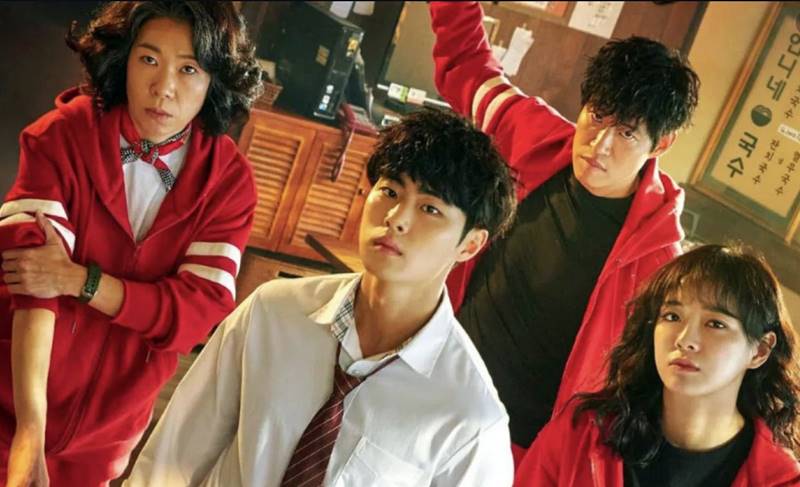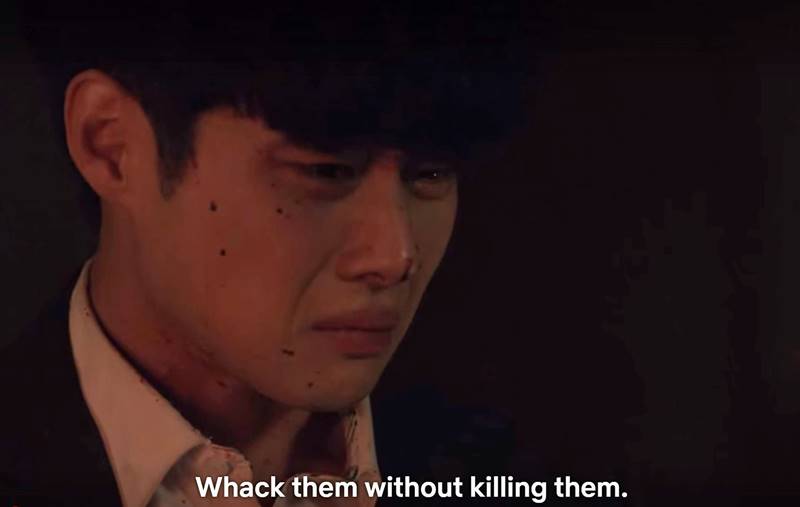By Jae-Ha Kim
Substack
February 4, 2021
☆☆☆☆
So Mun (played by Jo Byung-gyu)
Ga Mun-tak (played by Yoo Jun-sang)
Do Ha-na (played by Kim Se-jeong)
Cho Mae-ok (played by Yeon Hye-ran)
↑Note: Korean names denote the surname followed by the given name.
I realize it’s barely two months into 2021, but I imagine that “The Uncanny Counter” will be on my year-end list of best K-Dramas. Well written and terrifically acted, the series is suspenseful and heartwarming. And in a rarity for Korean dramas, there is no second lead syndrome romance to mess with the plot.
Mun is a high school student who walks with a severe limp. As an 11 year old, he was in an automobile accident that killed his police officer parents. He is racked with guilt, because he had fibbed to them, saying he needed them to pick him up early because he had forgotten his schoolwork. In reality, he missed them and wanted to spend time with them. (He lived with his grandparents for most of the week due to his parents’ hectic schedules.) He is a good boy, who helps care for his grandmother, who has Alzheimer’s disease. And he is best friends with Woong-Min (Kim Eun-soo) and Joo-Yeon (Lee Ji-won).
The friendship between Mun, Woong-Min and Joo-Yeon is so sweet and special that it was one of my favorite aspects of this series. After losing his mother and father, his friends became his de facto parents, he said, even though they are all the same age. In one scene near the end of the series, Mun — who has always tried to protect the bullied Woong-Min — calls his friends, sobbing, asking for their help. They literally drop everything to rush to his aid.
There will be a second season (yay!) and it is my hope that the writers don’t ruin this friendship by trying to force a love triangle between this trio or by having Joo-Yeon become jealous of Mun’s interest in another girl. Please don’t do that!

While going about his day, Mun unknowingly becomes the human host for a powerful good spirit, who is hopeful that Mun will become a counter. A deal is made: If he agrees to fight evil spirits (that grow stronger by entering the bodies of corrupt human beings), he will retain his newfound super-human strength and his ability to walk normally.
The central spot for the city’s counters — which include former police detective Mun-tak, photographer Mae-ok and Ha-na, who was the only survivor of poisoning in her family — is Eonni’s Noodles, a hole-in-the-wall diner where customers line up for the delicious homemade noodles. The restaurant serves as a focal point for many of the pivotal moments. The older three counters live in the basement quarters. (Mun lives at home with his grandparents.) And as the counters celebrate their victories or mourn their losses, Mae-ok makes noodles for them to slurp down, providing sustenance.
The symbolism of the noodle shop is relevant, because noodles represent a long and prosperous life. And for the counters, their defeat of the demons not only ensures their survival, but that of the good spirits they host.
A big shout out to the stunt coordinators, who created some of the most exciting fight scenes in recent years. Like the cast of “Cobra Kai,” most of these actors are not trained in martial arts. But they sell it with their nimble athleticism, especially Jo Byung-gyu (one of the twins in “SKY Castle“), who plays Mun.
“The Uncanny Counter” cleverly touches on many of the societal issues plaguing South Korea, like hierarchy and education. The chillingly creepy female demon takes umbrage when it’s suggested that she’s not very smart. “I’ll have you know that all my husbands were graduates of Seoul National University!” she screams back at them. (She also killed all of them, so … there’s that.)
The bullying that goes on at the high school is sometimes unbearable to watch, with teachers not reporting the well-connected perpetrators and parents denying their children’s culpability. But in flashbacks, we will see that violence begets violence and some of the characters that we absolutely hated will be given a sympathetic backstory that almost makes us forgive them.
This bothered me: The open/closed sign for Eonni’s Noodles is on the outside of the door, which I found very odd. A prankster could stop by and switch the sign around without anyone knowing. Why not have this on the inside of the door where the employees would have better control over the sign?

Airdates: Sixteen hour-long episodes aired on OCN from November 28, 2020 to January 24, 2021.
Spoiler Alert: In elementary school, Woong-Min bullied Mun, knowing that the crippled boy wouldn’t be able to catch him. One day, Mun followed him home and the boys somehow sorted things out and became best friends. When Woong-Min and Joo-Yeon find out that Mun can walk normally again, they at first chide him. They are family, Joo-Yeon says, who celebrated all the momentous times of their lives together. She points out that when she started her period, they all went out to celebrate this passage in her life. I really loved that this was presented in a matter-of-fact manner. Menstruating isn’t something to be ashamed of or hidden away from boys. More of this, please!
The high school bully who loses his status when his father loses his power ends up apologizing to everyone he ever bullied and quits school. It was a sweet touch, but I will never forget that he was also a sociopath who tried to kill Mun and his friends several times.
Mun has a lot of responsibility for a high school kid. He will lose his job as a counter if he uses his powers for revenge or kills any innocent civilians. It was maddening to watch the powers that be up there expect so much from a teenage kid.
Ahn Suk-hwan ate up the scenery as chaebol Choi Jang-mul, who has a huge crush on Mae-ok, and funds the counters’ expenses. The hugest plothole in this series was when Jang-mul showed up at school and said he was Mun’s guardian. The school administrators and other parents in attendance were shocked, but the news never made it out of the school. Surely the revelation that one of the richest men in South Korea announcing that he was the father figure to an orphaned child would’ve made headlines. But, nope.
© 2021 JAE-HA KIM | All Rights Reserved






The store sign bothered me too, as did the fact that everyone knew where the business was, but did nothing to try to target the building after their first encounter. People who know how to bury solid waste should be more savvy than that. It didn’t take away overall from my enjoyment of the series though.
I completely agree!!